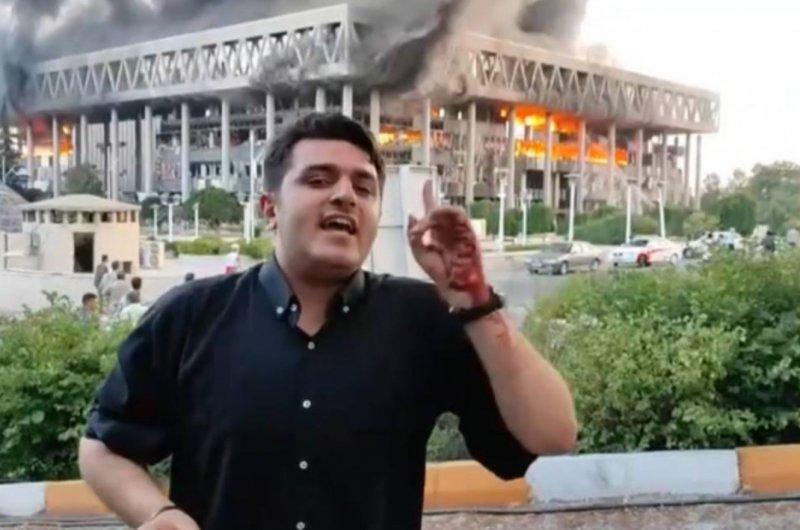On Monday, June 16, 2025, an Israeli airstrike targeted the headquarters of Iran’s state broadcaster, the Islamic Republic of Iran Broadcasting (IRIB), in Tehran, causing significant damage and briefly halting live transmissions. Despite the attack, IRIB defiantly resumed broadcasting within hours, showcasing resilience amid escalating tensions between Iran and Israel.
The strike occurred during a live broadcast on the Islamic Republic of Iran News Network (IRINN), a key channel operated by IRIB. Anchor Sahar Emami was delivering a bulletin when a loud explosion rocked the studio, filling the set with dust and debris. Footage captured the chaotic moment as Emami fled the set, with cries of “Allahu Akbar” (“God is greatest”) audible in the background. The broadcast abruptly switched to pre-recorded programming as the studio was engulfed in smoke.
Videos circulating on social media showed the IRIB building, often referred to as “the glass building” in Tehran’s affluent District 3, ablaze with thick black smoke billowing into the sky. A visibly injured IRIB correspondent, Younes Shadlou, reported from outside the burning structure, his hands bloodied, stating, “I was on the first floor when the bomb was dropped. I don’t know how many of my colleagues were killed.” Despite the destruction, Shadlou declared, “We are not afraid, and we are not leaving.”
The Israeli Defense Forces (IDF) confirmed the strike, claiming the IRIB building was a “communication center” used by the Iranian Armed Forces for military purposes under the guise of civilian activity. Israeli Defense Minister Israel Katz described the attack as targeting “the Iranian regime’s propaganda and incitement broadcasting authority,” signaling a broadening of Israel’s military campaign beyond Iran’s nuclear and missile infrastructure. The IDF had issued an evacuation warning for Tehran’s District 3, home to approximately 330,000 residents, hours before the strike, urging civilians to leave the area.
Iranian officials condemned the attack as a “war crime” and a “direct assault on press freedom.” Iran’s Foreign Ministry spokesman, Esmail Baqai, called it a “wicked act,” while the Islamic Revolutionary Guard Corps labeled it “inhuman” and “criminal.” The Committee to Protect Journalists (CPJ) expressed outrage, stating, “Israel’s bombing of Iran’s state TV channel while live on air” was emboldened by “impunity for the killings of almost 200 journalists in Gaza.”
Casualties from the strike remain unclear. Iranian state media reported that Masoumeh Azimi, an IRIB Secretariat employee, was killed. Anchor Sahar Emami later mentioned “bodies of reporters” at the site, though no official count of injuries or deaths was confirmed. Foad Izadi, a professor at the University of Tehran, estimated that the building, which houses hundreds of employees across multiple floors, could have significant casualties due to its size.
Related Articles:
- Trump urges Iran to make nuclear deal, warning of ‘more brutal’ attacks
- The Unending War Between Israel and Iran: Renewed attacks surge amid Trump’s warnings
- Israeli airstrike kill Iran’s lntelligence Chief Gen. Mohammad Kazemi, deputy
Remarkably, IRIB resumed live broadcasting within hours from an alternate studio. Sahar Emami returned to the air, speaking defiantly alongside another anchor. Peyman Jebelli, IRIB’s head, appeared on television holding a blood-stained paper, declaring that the channel’s employees were “standing until the end” in what he called a “hybrid war” initiated by Israel. The swift resumption of broadcasting was seen as a symbolic act of defiance, with Al Jazeera’s Tehran correspondent Tohid Asadi noting that Emami’s return could boost her popularity among viewers.
The attack on IRIB is part of a broader escalation in the Israel-Iran conflict, now in its fourth day as of June 16, 2025. Israel launched a series of strikes targeting Iran’s nuclear and military facilities, claiming to have achieved “full aerial superiority” over Tehran. Iran retaliated with over 100 missiles aimed at Israeli cities.
The strike on IRIB drew international attention, with some analysts viewing it as a strategic move to disrupt Iran’s state-controlled media, which Israel accuses of spreading propaganda. Lisa Daftari, an Iran expert, told Fox News Digital that targeting IRIB was a “stark message” challenging not just Iran’s military capabilities but its “power structure itself.” Others, including Iran’s ambassador to the United Nations, Amir Saeid Iravani, criticized the attack as an assault on press freedom.
As Tehran grapples with the aftermath, residents face widespread disruption. Traffic jams clogged highways as many fled the capital, and businesses, including 80-90% of shops in Tehran, reportedly closed. Iran issued retaliatory evacuation warnings for Israeli news channels N12 and N14, signaling further escalation.
The resilience of IRIB in resuming broadcasts underscores the high stakes of the ongoing conflict, where both sides are not only targeting military assets but also symbols of national resolve. As the war continues, the international community watches closely, with calls for de-escalation growing amid fears of a broader Middle East conflict.






